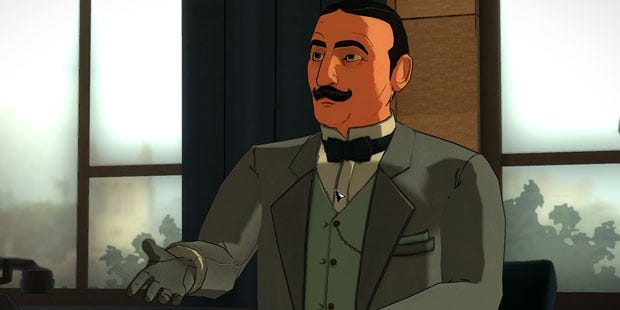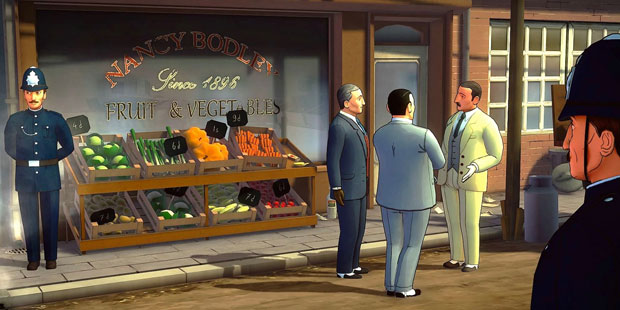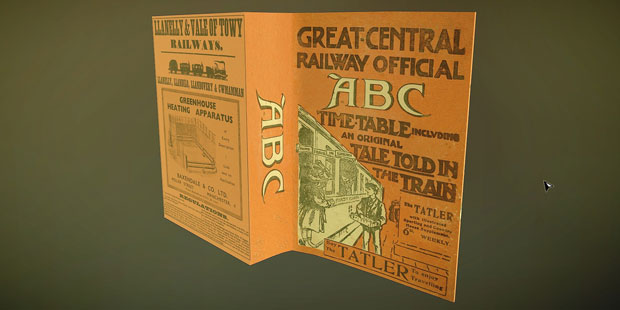Wot I Think: Agatha Christie - The ABC Murders
An alphabetical murder
When I wrote about the preview snippet of Agatha Christie - The ABC Murders [Steam page]I wasn't sure what to make of it. The art style felt pleasant and the extra points for behaving as Poirot would were a nice touch, but the puzzles were straightforward and you weren't really playing as Poirot. The overall impression was of a studio trying to make a murder mystery story into a game and adding a lot of superficial interactivity. So does the full game succeed where the snippet failed? Here's Wot I Think:
To start off I wanted to explain why I love Poirot stories so much. Agatha Christie writes great mysteries generally but the fastidious Belgian has a real pull on my heart. He's incredibly intelligent, but he's also rounded out by little foibles.
There's a touch of vanity, a love of comfort and a kind of obsessive regard for his sensitive stomach. He isn't ridiculous but there's an oddness to him that makes me smile and causes me to feel fond. His exasperation with Hastings as their personalities clash and then his warmth towards him make me value that partnership too. In terms of adaptations, I adore David Suchet's Poirot because he captures these elements of the character so well. I cried after the very last mystery, Curtain, aired because I didn't want to say goodbye.
This game does best when it manages to capture the feel of those novels the way the ITV adaptation did - Christie's lightness of touch, Poirot's mannerisms, how he interacts with the varied cast of suspects and friends... It's at its worst when it gets bogged down in repetitive puzzles, ambiguity, sledgehammer-type subtlety.
My basic emotional trajectory with it was to start off with PLEASANT BUT NOT TAXING I AM ENJOYING AGATHA CHRISTIE'S STORY and then about two thirds of the way through it accelerated downwards into HOW MANY MORE TEDIOUS BOX-UNLOCKING PUZZLES WILL THERE BE before plateauing at PIECING TOGETHER THESE CLUES FEELS SO INEXACT AND I AM SICK OF THIS OBSERVATION SYSTEM.
The story itself was still good because it's a really great mystery, but the interactive elements really outstayed their welcome for me and the clue system seemed to become woolier and woolier before, as part of the denouement, I had to make a choice which made me swear out loud with irritation.
The game takes the form of a fairly standard point and click affair. You click to move Poirot around and mouse over objects and people to either talk, look or interact with them. Play divides into observation sections where you move the mouse around to look at clues, thinking sections where you solve a puzzle, interview sections where you chat to people and "grey cells" bits where you piece together the clues to inch closer to the solution. The rest is moving around scenery or getting bits of exposition. You'll have access to character profiles showing what you've learned about each person (I never needed these at all for the game) and a list of current objectives just in case you've forgotten what you're supposed to be doing.
It starts out okay. It's not exciting, but the interactivity layer isn't getting in the way of the story. The voice acting is... variable. Some decent, some dreadful. I rather liked Poirot's whereas I spent most of my conversation with a greengrocer contemplating the mute button. The art style is decent although I wish I had the ITV adaptation to hand to compare the two. Poirot's home in the game is based on the same buildings using for the ITV show and I have this feeling that a couple of the scenes showing a particular character are referenced as well. WHERE THE HECK IS MY DVD? My curiosity must be assuaged!
The meat of the game is in the piecing together of the clues and the solving of these puzzles. Mostly you're figuring out how to unlock a box of some sort. They're not challenging because of the way the game feeds you the clues, but as you get further in most of them require you to complete multiple parts or segments. The result isn't an increase in challenge, just an increase in the time it takes. There was one puzzle towards the end which showed a glimmer of being more taxing but it also involved having you wander back through rooms you'd already wandered which mitigated my brief flicker of interest.
The Grey Cells segments felt a little more "Poirot" because you were piecing together information rather than doing physical puzzle solving. But there's a strange difficulty curve within those sections. What I mean is that you start off solving them fast – there's only one set of clues you can combine to answer the question. Towards the end of the game these are harder to fathom. The problem is that they become harder, not because the questions are harder and you have to think round corners, but because they're more ambiguously worded.
Many of the clues could produce the answer (some had even been mentioned by Poirot in regard to the same idea earlier in the game) because the question was phrased so loosely. A couple of times, to find out which ones the game wanted, I resorted to combining clues from the set until it produced the correct result.
The observation sections also outstay their welcome. You waft the mouse around and the display focuses in on particular evidence – smudged makeup, creased clothes, disorganised possessions. It's like a vaguely interactive and very pared down version of how the BBC series Sherlock conveys Holmes' appraisal of a situation. Towards the end I found myself zoning out during these bits as they tended to add nothing to the experience. There are a few slightly more involved observation sequences which involve rotating objects to get a better look at them. With those the interaction is often utterly unnecessary - in almost every case the game places them upside down when you start so the interaction is just turning them over then listening to Poirot make an observation.
Towards the end of the game there's a choice you must make. In the book Poirot handles the same matter slightly differently off-screen based on his solution to the case and his study of the people involved (sorry to be vague but I don't want to spoil either book or game). In the game you make it without having reached that same point of understanding or with that level of forward planning. Unless you know the book I don't know how that choice will be anything other than blind luck. It then felt strange and meaningless – a stupid gamble where Poirot always operates with precision. I'm curious as to how the other choice plays out but because of the autosave I'd have to play the whole thing again.
There's also a weird anachronism in the game which I found hugely jarring - a foreword for a book written by someone who was only born about 20 years after the game is set. Maybe it was supposed to be an in-joke or maybe it was just careless. But in a game about a a fastidious detective, mistakes like that, and like Poirot's erroneous reference to a greengrocer which I pointed out in the preview, disrupt the flow.
Something I was also talking about in the preview was how you don't actually play Poirot. You spend most of your time as the detective completing the busywork that the novel leaves to the police. This is because Poirot spends a lot of his time in his own head or coaxing information out of people whereas the police procedures do lend themselves to point and click formats. So it's understandable but it's not very satisfactory.
To put it another way, in the book your experience of the case is through Captain Hastings' telling of the story. He acts as your proxy and explains the progressions of the plot as Poirot reveals them to him. Watson has a similar role in Sherlock Holmes stories. The ABC Murders game tells you you're in Poirot's shoes (patent leather ones, please don't scuff them) but then plays out with the same drip feed of information.
You're still really Hastings (or at least that Hastings-like audience proxy). You have to be for the story to work. If you were Poirot it would ruin the reveal at the end. There would be no point in the theatrics of a denouement because you'd have the answers at that point. I only bring this up because the game's Steam page declares "You are the famous private detective Hercule Poirot".
I'm trying to work out how the game might be for someone who deosn't know the story or is less invested in Poirot. I think they will appreciate the settings and the story (it is SUCH a good story, especially if you don't know it) but my suspicion is the uninspiring and repetitive nature of the puzzles will eventually still get in the way of the enjoyment simply because of how it gates or slows delivery of the story. If you do know the story already I don't think this adaptation contributes anything new and a lot of the lovely touches in the novel are stripped down or stripped out. The novel itself actually has this through-line of melancholy and mortality, as well as pockets of gentle humour, nearly all of which is lost.
From my own point of view and with the relationship I have with the character, the game is competent and functional, but uninspired. There's certainly nothing in the interactive sections that comes close to the spark or originality of the plot. The game also comes nowhere near putting your wits "to the ultimate test" as it claims on the Steam page.
I associate Agatha Christie with a paciness and lightness of touch. It was there in this game at brief intervals but would then get obscured again as a scene dragged on for too long or you had to hover your mouse over a cigarette someone was holding AND a box of matches AND an ashtray in order to deduce they were a smoker. Eventually it just felt like the interactive elements stopped being a mild diversion and became an obstruction.
Agatha Christie - The ABC Murders is out now.














